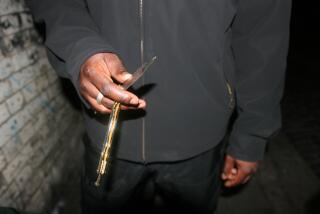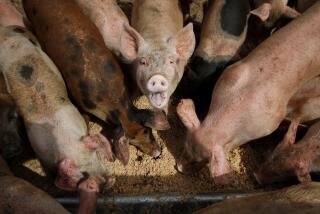Bone of Contention Sticks in Court’s Craw
- Share via
SAN FRANCISCO — A state Court of Appeal, adding new fuel to a novel legal controversy, refused Monday to permit a Mexican restaurant to be sued by an Alameda County man injured by a one-inch chicken bone that lodged in his throat as he ate a chicken enchilada.
With apparent reluctance, the appeals panel concluded that its ruling was required under a 1936 state Supreme Court decision in a case involving a chicken bone concealed in a chicken pie. In that ruling, the high court held that such suits were barred when the bone is “natural” to the food served.
Monday’s decision may provide the current Supreme Court with added incentive to take a new look at the issue and resolve conflicts that have emerged within the state’s appeals courts.
Just last month, the justices let stand a contrary ruling by an appeals court in Los Angeles that allowed a woman to sue for a broken tooth she suffered from a bone fragment in a hamburger she bought at a Granada Hills restaurant.
In a special plea to the high court, Appellate Justice Marc Poche issued a separate concurrence in Monday’s ruling “to stress my concern with the present state of the chicken bone law.” The 1936 decision was “wrongly decided in light of the modern law of products liability,” he said, and the issue is “ripe for consideration by our Supreme Court.”
A similar note was sounded by William L. Berg, an Oakland attorney representing the restaurant customer whose suit was barred Monday by the appellate panel. “We will definitely appeal to the state Supreme Court,” he said. “I’m quite surprised by this ruling.”
‘The Law Is Clear’
Scott A. Bovee of Oakland, a lawyer for the defendants in the case, welcomed the decision, saying, “The law is clear that the restaurant is not liable for this kind of accident.”
The dispute arose in a suit filed by Jack Clark, 34, against the owners of the Mexicali Rose restaurant in Alameda. Clark said that a bone from the enchilada lodged in his throat, causing injuries that resulted in surgery three times and medical bills of more than $25,000.
The restaurant, citing the high court’s 1936 ruling, asked an Alameda County Superior Court judge to throw out the suit. But the judge refused and the restaurant took the case to the state Court of Appeal in San Francisco.
Meanwhile, the other appeals court last June upheld a similar suit over the beef-bone fragment concealed in a hamburger bought by Patrice F. Evart of Los Angeles. In this case, the appellate panel concluded that the 1936 ruling barred suit only when it was “common knowledge” that a bone, pit or other natural component might turn up in the food. Evart could still try to persuade a jury that it was not reasonable to anticipate and protect against a bone in her burger, the panel said.
“The rule of the (1936 decision) is that a dish containing a bone natural to the food served is not a defective dish regardless of whether negligence was used in its preparation and irrespective of the size of the bone or the damages it caused,” Appellate Justice Carl West Anderson wrote in an opinion joined by Appellate Justice James F. Perley Jr.
More to Read
Eat your way across L.A.
Get our weekly Tasting Notes newsletter for reviews, news and more.
You may occasionally receive promotional content from the Los Angeles Times.










